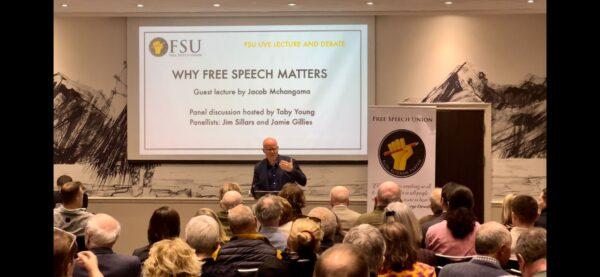A controversial new hate crime law, described as “dangerous” by free speech activists and MPs, is set to come into effect next month.
The new law creates new “stirring up of hatred offences” for protected characteristics, including “age, disability, religion, sexual orientation, and transgender identity.”
The act has been described as “dangerous,” and could see people prosecuted in their homes, by a range of free speech groups and Scottish Conservative MPs.
Despite being inactive, Police Scotland has been readying itself to implement the act by extensive hate crime training.
Hate Crime Third Party Reporting Centres
Police also set up designated “Hate Crime Third Party Reporting Centres” which include housing associations, victim support offices, voluntary groups, and even private businesses such as fish farms, caravan parks and even a sex shop in Glasgow.Police say that staff “have been trained to recognise hate crimes and help a victim or witness to submit a report to the police.”
Stuart Waiton, senior lecturer in sociology and criminology at Abertay University, has previously called it the most “illiberal and censorious bill in any liberal democracy in the world.”
He is part of the campaign group Free to Disagree, which highlights the threat that the act poses to free speech.
Mr. Waiton told The Epoch Times by email: “When is a law not a law? When the incoherent Scottish government draft it.”
“The Hate Crime Bill was passed three years ago, but it has taken this long for the police to be prepared to implement it,” he said.
He said that the “woolly language and the implications of a bill that could see people arrested for muttering ‘incorrect’ statements in their own home are of the utmost seriousness.”
“Unfortunately, this bill once again demonstrates the dangerous nature of the Scottish government, where a bill the public oppose is forced upon them against their will in a manner that reflects the elitist, almost aristocratic nature of the court like system in Holyrood,” said Mr. Waiton.
He said the law is “part of a protection racket being developed by the modern elites, whose views of the ‘deplorable’ public mean they feel the need to invent ever more ‘protected characteristics’ who they (the good people) can then protect.”
“In the process, the public are educated about this imagined world of hate, where every minority is encouraged to think that they are under seige, and where, as a result, divisions are exaggerated and encouraged, and ultimately forced upon us through the power of the state and the police.”

Reacting to the news, the Free Speech Union (FSU) pointed out that the Scottish government disclosed that age will become a protected characteristic later this year, meaning that describing someone as a “grumpy old man” or a “callow youth” could soon constitute a hate crime.
FSU said that the law empowers the Scottish state to prosecute individuals for what is communicated in private as well as in public.
Humza Yousaf
The Scottish National Party’s bill, introduced by First Minister Humza Yousaf when he was justice secretary, was approved by the Scottish Parliament in 2021 and has received Royal Ascent. It has been dormant until now.The bill has been criticised as authoritarian because it further restricts what can and cannot be said in a public forum.
The Scottish Government says the new act is designed to make hate crime law “fit for the 21st century“ and defines hate crime as the phrase used to ”describe behaviour which is both criminal and based on prejudice.”
“Stirring up hatred offences” will apply to characteristics including age, disability, religion, sexual orientation, transgender identity, and variations in sex characteristics, which some argue will clash with the expression of views on all manner of subjective beliefs.
Lived Experience
In a statement, Minister for Victims & Community Safety Siobhian Brown said a new campaign to highlight the law is informed by “lived experience.”“For those impacted by hatred and prejudice, the results can be traumatic and life changing. While we respect everyone’s right to freedom of expression, nobody in our society should live in fear or be made to feel like they don’t belong, and the Scottish Government is committed to building safer communities that live free from hatred and prejudice.
“Hate crime is behaviour that is both criminal and rooted in prejudice. It can be verbal, physical, online or face-to-face. The new law will give greater protections to those who need it and helps to form the basis of understanding about the type of behaviour that is not acceptable in our society.
“We must do all we can to give victims and witnesses the confidence to report instances of hate crime, which is why we have launched a new campaign, ‘Hate Hurts’. The campaign is informed by lived experience, and explains what a hate crime is, the impact it has on victims and how to report it.”
Hate Crime Workshops and Training
A Police Scotland spokesman told The Epoch Times by email: “Police Scotland has used Hate Crime Third Party Reporting Centres for a number of years.“In some cases, victims and witnesses of a hate crime may not feel comfortable approaching the police directly. Third Party Reporting Centres provide them with a safe space to make a report, and we constantly review these alongside the Scottish government.
“Any business or organisation can volunteer to be a Third Party Reporting Centre, and they reflect the diverse nature of our local communities. Staff are trained to ensure they can assist victims or witnesses.”
The spokesman confirmed to The Epoch Times that police are undergoing an extensive programme of hate crime workshops and training.
‘Serious Questions’
A number of Scottish Conservative MPs expressed major concerns to The Epoch Times by email.Scottish Conservative shadow justice secretary Russell Findlay MSP said: “Scotland’s police officers have been pushed to breaking point by relentless SNP cuts, so expecting them to enforce this flawed legislation should not be a priority.
“The belated enforcement of Humza Yousaf’s flawed and dangerous Hate Crime Act comes days after Police Scotland admitted they won’t investigate a range of other crimes,“ he added, stating that he ”would bin this law, which risks harming free speech.”
Scottish Conservative MSP Annie Wells said that “serious questions must be asked as to who thought a sex shop was an appropriate setting to report a hate crime.
“The SNP’s act is flawed enough without asking people to relay their experiences in this sort of outlet in the heart of the city centre.
“Glaswegians will rightly be wondering what the thinking behind this decision. Police Scotland should drop this shop from their reporting centres as a matter of urgency.”
A Scottish spokesman told The Epoch Times by email, “As Police Scotland has said victims and witnesses of a hate crime may not feel comfortable approaching the police directly.”
He said that is why “Third Party Reporting Centres, which have been in place for a number of years, offer a safe alternative space to make a report.”
“Our Hate Crime Strategy commits to review third-party reporting arrangements in partnership with Police Scotland, which has already commenced. A short-life working group will re-evaluate the criteria of a third-party reporting centre, recording and maintenance of the scheme and how to improve support for centres and victims,” he added.






